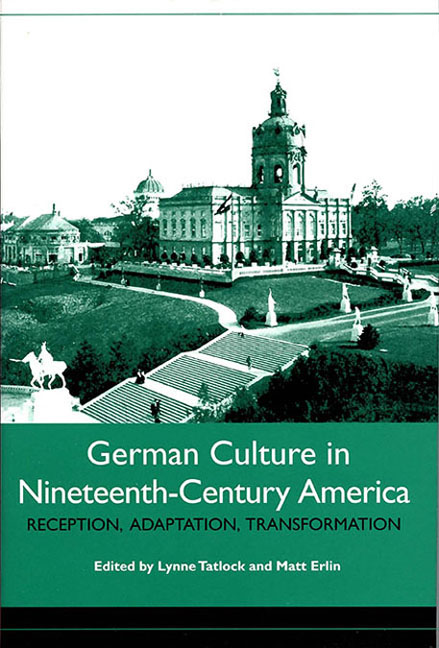Book contents
- Frontmatter
- Contents
- List of Illustrations
- Acknowledgments
- Introduction
- 1 Cultural Politics at the Turn of the Twentieth Century
- Cultural History: An American Refuge for a German Idea
- The Image of Culture — Or, What Münsterberg Saw in the Movies
- Tacitus Redivivus or Taking Stock: A. B. Faust's Assessment of the German Element in America
- The St. Louis World's Fair of 1904 as a Site of Cultural Transfer: German and German-American Participation
- 2 In Pursuit of Intellectual Culture
- 3 Translation American Style
- 4 Immigration and Naturalization Acts
- Contributors
- Index
Tacitus Redivivus or Taking Stock: A. B. Faust's Assessment of the German Element in America
from 1 - Cultural Politics at the Turn of the Twentieth Century
Published online by Cambridge University Press: 13 April 2017
- Frontmatter
- Contents
- List of Illustrations
- Acknowledgments
- Introduction
- 1 Cultural Politics at the Turn of the Twentieth Century
- Cultural History: An American Refuge for a German Idea
- The Image of Culture — Or, What Münsterberg Saw in the Movies
- Tacitus Redivivus or Taking Stock: A. B. Faust's Assessment of the German Element in America
- The St. Louis World's Fair of 1904 as a Site of Cultural Transfer: German and German-American Participation
- 2 In Pursuit of Intellectual Culture
- 3 Translation American Style
- 4 Immigration and Naturalization Acts
- Contributors
- Index
Summary
Albert Bernhardt Faust's analysis of the “German element in America” is a work of some impact. The two-volume text was originally published in English in 1909 by Houghton Mifflin in Boston under the following title: The German Element in the United States with Special Reference to Its Political, Moral, Social, and Educational Influence. Three years later, Faust, literary scholar and historian, and professor at Cornell University, published a revised edition in German. Das Deutschtum in den Vereinigten Staaten in seiner Bedeutung für die amerikanische Kultur (The German Element in the United States and its Influence on American Culture) was the title of the first volume (which was part two of the original English version). The second volume was called Das Deutschtum in den Vereinigten Staaten in seiner geschichtlichen Entwicklung (The German Element in the United States and its Historical Development). In the preface to the first volume of the German edition the author expresses his particular gratitude to Hugo Münsterberg, head of the Amerika-Institut in Berlin, who “[sparte] weder Zeit noch Mühe . . ., um der deutschen Ausgabe den Weg zu bahnen” (DB, vii; spared neither time nor effort to clear the way for the German edition). The English edition was revised in 1927, and this version was reprinted many times, even as late as 1995. Faust was awarded various prizes: as early as 1907, the Germanic department of the University of Chicago awarded first prize to the manuscript of The German Element in the United States in a contest on precisely that subject. The prize had been donated by Catherine Seipp at the suggestion of the German Consul-General in Chicago. Four years later, in 1911, Faust received the Loubat Prize for American history from the Prussian Academy of Sciences in Berlin.
The two-volume 1927 edition of Faust's work, paying tribute to the achievements of German cultural transfer during the long nineteenth century, comprises more than twelve hundred pages. Today, Faust's collector's mania and accurate systemization of German “tendencies” still compel admiration. Among other things, the first volume is concerned with “The Earliest Germans in the Anglo-American Colonies,” “The Germans as Patriots and Soldiers, during the War of the Revolution,” the German contribution to “The Winning of the West,” “The German Element in the Wars of the United States during the Nineteenth Century,” and the “German Immigrations of the Nineteenth Century; Their Location, Distribution, and General Character.”
- Type
- Chapter
- Information
- German Culture in Nineteenth-Century AmericaReception, Adaptation, Transformation, pp. 43 - 58Publisher: Boydell & BrewerPrint publication year: 2005



